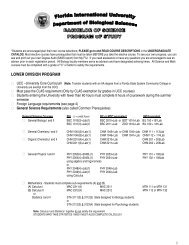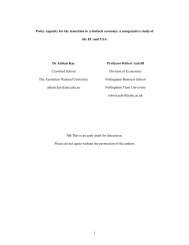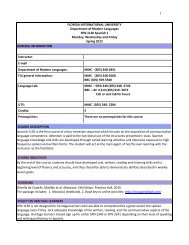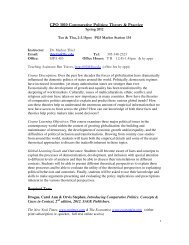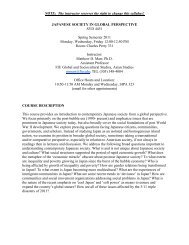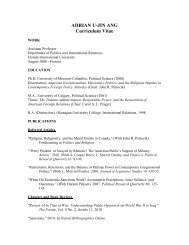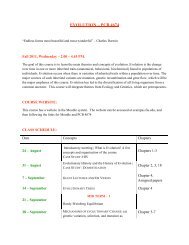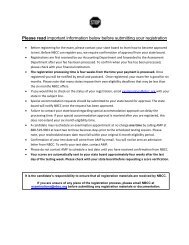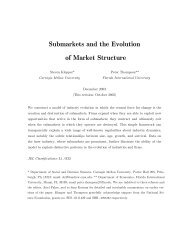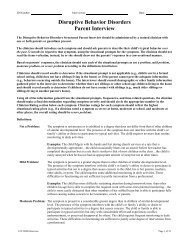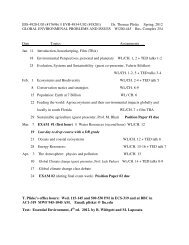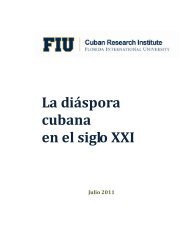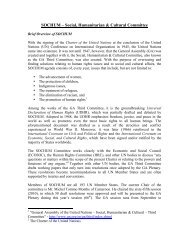Women's Studies - College of Arts & Sciences - Florida International ...
Women's Studies - College of Arts & Sciences - Florida International ...
Women's Studies - College of Arts & Sciences - Florida International ...
You also want an ePaper? Increase the reach of your titles
YUMPU automatically turns print PDFs into web optimized ePapers that Google loves.
Featured Consortium Member: Dr. Fatima Sadiqi<br />
Fatima Sadiqi is a former Fulbright Scholar<br />
and recipient <strong>of</strong> a Harvard Fellowship. She is<br />
Senior Pr<strong>of</strong>essor <strong>of</strong> Linguistics University <strong>of</strong> Fez in<br />
Morocco, director <strong>of</strong> the Isis Centre for Women<br />
and Development, and co‐founder <strong>of</strong> the<br />
<strong>International</strong> Institute <strong>of</strong> Languages and<br />
Linguistics. Dr. Sadiqi has written extensively on<br />
Moroccan languages and Moroccan women’s<br />
issues. She is the author <strong>of</strong> Women, Gender, and<br />
Language in Morocco (Brill, 2003), Grammaire du<br />
Berbère (L’Harmattan, 1997), Images on Women in<br />
Abdullah Bashrahil’s Poetry (The Beirut Institute:<br />
2004). She has also edited and co‐edited a number<br />
<strong>of</strong> volumes, including Migration and Gender in<br />
Morocco (with Moha Ennaji, Red Sea Press: 2008)<br />
and Women Writing Africa. The Northern Region<br />
(with Amira Nowaira, Azza El Kholy and Moha<br />
Ennaji, The Feminist Press, CUNY). Her article on “Morocco” in Women’s Rights in the Middle East and<br />
North Africa (Freedom House and Roman & Littlefield) will be published in March 2010. Recently Dr.<br />
Sadiqi was elected President <strong>of</strong> Morocco's National Union <strong>of</strong> Feminine Associations.<br />
Women in the Middle East and North Africa:<br />
Agents <strong>of</strong> Change<br />
By Fatima Saqiqi and Moha Ennaji<br />
This book examines the position <strong>of</strong> women in the<br />
contemporary Middle East and North Africa (MENA)<br />
region. Although it is culturally diverse, this region<br />
shares many commonalities with relation to women<br />
that are strong, deep, and pervasive: a space‐based<br />
patriarchy, a culturally strong sense <strong>of</strong> religion, a<br />
smooth co‐existence <strong>of</strong> tradition and modernity, a<br />
transitional stage in development, and multilingualism/<br />
multiculturalism.<br />
Experts from within the region and from outside<br />
provide both theoretical angles and case studies,<br />
drawing on fieldwork from Egypt, Oman, Palestine,<br />
Israel, Turkey, Iran, Tunisia, Algeria, Morocco, and<br />
Spain. Bringing to light <strong>of</strong>ten marginalized topics and<br />
issues, the book underlines the importance <strong>of</strong><br />
respecting specificities when judging societies and<br />
hints at possible ways <strong>of</strong> promoting the MENA region.<br />
Women’s <strong>Studies</strong> Center Annual Report, 2009-2010 53




